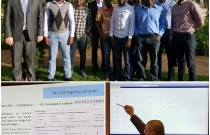Workshop on Advanced Load Flow Analyses and PSS/E Model Maintenance
While the previous PSS/E training was more focused on theoretical usage of PSS/E software, this workshop focused more on practical usage of PSS/E software within EUCL departments. All the analyses were performed on recently developed and validated current state model for 2019. Together with the trainers, EUCL engineers performed advanced contingency analyses and identified all possible critical outages and appropriate preventive and corrective actions. The purpose of a remedial actions datasheet is to give direct instructions to grid control center dispatchers on how to save system integrity in case of some critical outage. The trainers also covered some additional topics that had been explained in the previous training, but this time used the validated current state 2019 model. The main topics of PSS/E workshop were:
- Basic contingency analyses overview
- Preparation of sub-system, monitoring, contingency and distribution-factor data files for running the automatic contingency analysis
- Running automatic contingency analysis
- Interpreting reports of contingency analysis
- Advanced contingency analyses
- N-1-1 Contingency Solution
- Multi-level AC Contingency
- Tripping Simulation
- Corrective actions
- Creation of remedial action plan
- Interpreting corrective actions report
- Table of corrective actions (automatic and manual)
- Voltage stability
- Static voltage stability analyses
- Voltage stability "weakness" identification
- Maximal transfer capability
- PV and QV curves analyses
- Reactive power compensation and control
- Reactive power support from generators
- Optimal locations of compensation devices
- Reactive power planning using PSS/E OPF
- Methodology of performing OPF, defining different constraints and optimizing parameters based on objectives
- OPF data organization
- GUI for OPF in PSS/E
- OPF data modelling
- Inertia and governor load flow
- Implementing renewable generation and simulating their effects on the grid
- Quick review of WF and PV theory
- Typical issues / Grid code requirements
- LF modelling issues in PSS/E
- Perspective model of Rwandan system
- Power flow simulations
- Voltage profile assessment
- Contingency analyses
- Conclusions and recommendations
- Requirements on additional data for short-circuit and dynamic analyses

